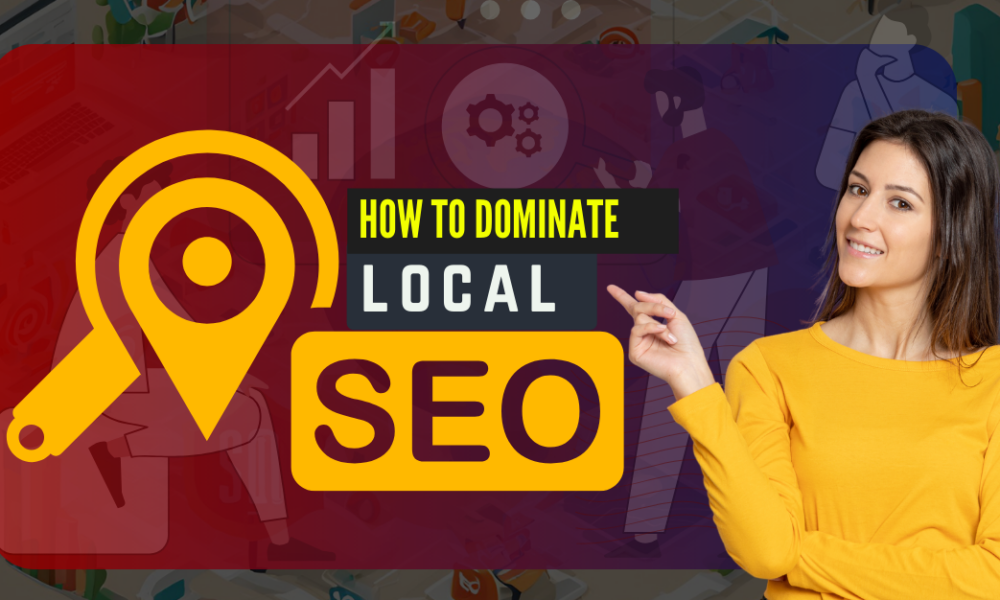Is your small business struggling to make a mark on the internet? Understanding local SEO can be a game changer. It opens up a world of opportunities for growth and success. As a small business owner, you must optimize your on-site and off-site SEO tactics so customers can find your website. Today, we’ll show you proven ways to control local SEO.
To begin with, we will discuss optimizing your Google My Business page using appropriate local keywords and engaging content. These potent strategies will help you appear higher in the local search results and get more potential customers for your business. So, let’s start with your journey toward success in local SEO.
What Is Local SEO? (Search Engine Optimization)
A practical local SEO approach can boost your website’s exposure in local search results. This can lead to an increase in clients from your immediate vicinity.
Customers will physically visit your store if you optimize for your city name and address. Search engines use signals like local content, social profile pages, links, and citations to rank businesses. These signals help determine which business is most relevant for a particular “service near me” search.
However, local SEO can help companies gain better exposure both nationally and internationally. Potential clients in their immediate surrounding areas may need the goods or services they offer.
According to Chat Meter, “near me” or “close by” searches have grown by +900% in less than 24 months.
Why Does It Matter for Your Location-based Business?
Customers now prioritize local sources of inspiration over constantly seeking it from external influences. For instance, eating places, shops, or any other enterprise that depends on clients physically coming to their premises should have local search engine optimization (SEO). Even if you operate your business via online stores, most of your customers will still be residents. Therefore, allow locals and tourists to know about your business establishment because success is only possible with this awareness.
People can easily find details about companies near you within seconds. Just type in one phrase, and Google Maps, store hours, and reviews appear immediately. Thus, if more visitors are to see where you work from, optimize for local SEO. Because of the importance of providing relevant search results, they take user location into account.
How to Dominate Local SEO?
To dominate local SEO, you must establish a solid local presence, optimize your website for local search, and perform other local SEO tactics. Organic SEO focuses on making a website more visible in search results worldwide, while local SEO focuses on making a website more visible in certain places.
Now, let’s talk about proven tips on how to dominate local SEO for small businesses:
Make your Google Business Profile better
If you’re not ready to optimize for local search yet, at least claim your Google Business Profile (GBP) listing. This is essential because it serves as the heart and soul of your local online presence. Optimize your GBP by adding your business name, address, and phone number, along with some photographs. This free listing can appear in Google Search and Maps, which brings new customers to you.
Here’s how to optimize your profile:
- Claim and verify your listing if you haven’t already done so.
- Make sure your business name, address, and phone number (NAP) match your website.
- Choose the right business category.
- Upload high-quality photos of your business, products or services, and team members.
- Write an interesting business description that includes relevant keywords.
- Keep hours accurate — especially on holidays!
- Ask for customer reviews and respond to them quickly.
- Share special offers or news about upcoming events through Posts.
- Follow up on questions in the Q&A part.
A current and well-optimized Google Business Profile will help you show up in the local pack results and give potential customers the information they need to choose your business.
Create Specific Location Pages on Your Website
When your company covers more than one area, having dedicated pages for each location is very important. Consider every page as a unique online store that serves a specific region only. First of all, create separate pages for each location. The following should be on these place pages:
- Name, address, or phone number of the business.
- An original account of the services you provide in that area.
- The text contains keywords related to the location it is about naturally.
- Testimonials are from customers who live nearby.
- Map and directions to where you are.
- Details about parking, public transport, etc.
- Photos of your business are there.
Location pages help search engines find more locally relevant information, which increases the chances of ranking for location-based searches.
Optimize for Local Keywords
Do keyword research to find out what location-based search terms people use to find businesses like yours. You can use Google Keyword Planner, Moz Keyword Explorer, or SEMrush to find useful keywords in the area.
Include these keywords into your writing naturally:
- Titles and meta descriptions for pages
- Subject headings and titles
- Text in the body content
- Image alt text & URLs
Here, we’ll share an example, if you run a bakery in Seattle, you might target keywords like “best bakery in Seattle” or “custom cakes in Seattle.”
Add your business to local Directories
Add information about your business to well-known web directories and citation sites. Here are some important ones:
- Yelp
- Yellow Pages
- Better Business Bureau
- Chamber of Commerce
- Industry-specific directories
Ensure all your business’s entries have the same name, address, and phone number. Inconsistent information can confuse search engines, which can hurt your results.
Get backlinks from other local websites
Backlinks from other trustworthy local websites tell search engines that your business is reliable and knows what it’s doing in your area. Here are some ways to get area backlinks:
- Sponsoring local events or sports teams
- Getting news stories in your area
- Joining business groups in your area
- Writing guest posts for area blogs
- Partnering with complementary local businesses
When it comes to backlinks, quality is the many important than quantity. A few good local links have many value than many bad ones.
Encourage and Respond to Reviews
To become the local SEO champion this year, plan for customer feedback. Compare businesses near you. According to 92% of users, recommendations are more important than brands.
So, Online reviews are critical for local SEO and help people decide what to buy. Ask satisfied customers if they would write a review on Google My Business (GMB), Yelp, or other relevant sites.
Whatever the review, positive or negative, respond quickly and professionally to all reviews–it shows good customer service and that you care about their opinions.
Create Location-Specific Content
SEO (search engine optimization) ensures your site or article performs well on any device or platform for the user.
Always confirm there is high-quality location-specific content; this should be the first thing you add to your site every time. By doing so, people who live nearby can find your business easily because of this local content.
Don’t forget to use hyperlocal phrases when optimizing pages for search engines. So many things can fall under this category such as headings and titles, metadata, image alt texts–everything. Some of these things may be:
- Blog posts about what’s going on in town
- Guides that tell people what they can do or see around here
- Case studies where we worked with clients from around this area
- Videos that show off our involvement with the community
This material can help us get links from other local websites as a local SEO agency.
Make it mobile-friendly

As mobile users continue to discover “near me” searches, local SEO becomes more reliant on mobile optimization. To attract these people, it’s important that you roll out the red carpet.
But how? The good news is that “Google PageSpeed Insights” can tell you how to speed things up. Type in your website URL and click “Analyze”. After a few seconds, you’ll either pass or fail. The thing about this test is that it’s a race. Make sure your site:
- Loads within 2 seconds.
- Is flexible enough to work on screens of all sizes.
- Has big, easy-to-tap menus and buttons.
- Uses words that are easy to read without zooming in or out.
But if you want specifics on what needs fixing, try Google’s mobile-friendly test.
Set up structured data markup on an individual level
Structured data markup is comparable to speaking the language of search engines fluently.
Incorporating structured data into your website allows Google to understand your business better. As a result, Google shows it in local search results as well. Moreover, this also increases your chances of appearing in rich snippets, which are highly coveted.
An effective tagging system goes beyond improving visibility. It enhances user experience by providing timely, relevant, and concise answers where users are looking for them.
No one will ever understand any word here unless they’re conversant with these technical terms. Fortunately, WordLift has employed artificial intelligence to handle everything on your behalf. And guess what? No expertise is required in technology.
Monitor and Improve Your Local SEO Performance
Always keep monitoring your local SEO success to identify new improvements. Follow these tips over time as they will help you in enhancing your local SEO strategy:
- How are you ranking for local keywords?
- Those searching for “near me.”
- Conversions from nearby visitors.
- Click rate on your Google My Business page.
Track area rankings with Google Search Console, Google Analytics, and more.
Use social media to the connect with people in the your area
Social media signals are not a direct ranking factor, but they can enhance your local SEO. You should use social networks to:
- Display your local content
- Communicate with businesses and customers in your area
- Promote events or specials happening near you
- Take pride in community service.
In addition, social media could drive more traffic to your site and increase your brand visibility, among others.
Final Thoughts
For small companies, dominating local SEO takes time and work, but the benefits are well worth it. To win at local SEO, include appropriate local keywords in your website copy, publish interesting content about your neighborhood, get listed on directories such as Yelp and Google Maps, and optimize your Google My Business account.
Try out these established pointers to increase visibility online and attract nearby patrons. Keep working on it while tracking your actions if you want optimal results. More info can be found at SEOs Hut–check them out. Start now with these tips because they will make a big difference in where people can find your business locally online.
Frequently Asked Questions About How to Dominate Local SEO
What are citation audits, and why are they important?
Citation audits ensure accurate business information across all online databases and directories. These checks protect against false information that could lower local search rankings and confuse potential customers.
How does voice search affect local SEO?
Voice searches often include a locator intent. Answer frequently asked questions within your content to make it more conversational and optimal for voice search optimization. Also, ensure that business information is updated and accessible to virtual assistants.
Why is it important to update business information regularly?
If you want people to know about your business, keep its details current. Updating listings signals activity and trustworthiness to search engines which may boost rankings on local searches.





![SEO Experts Gather for a Candid Chat About Search [Podcast] SEO Experts Gather for a Candid Chat About Search [Podcast]](https://virtual-coach.com/wp-content/uploads/2024/09/featured-image-1520-x-800-490-360x270.png)
